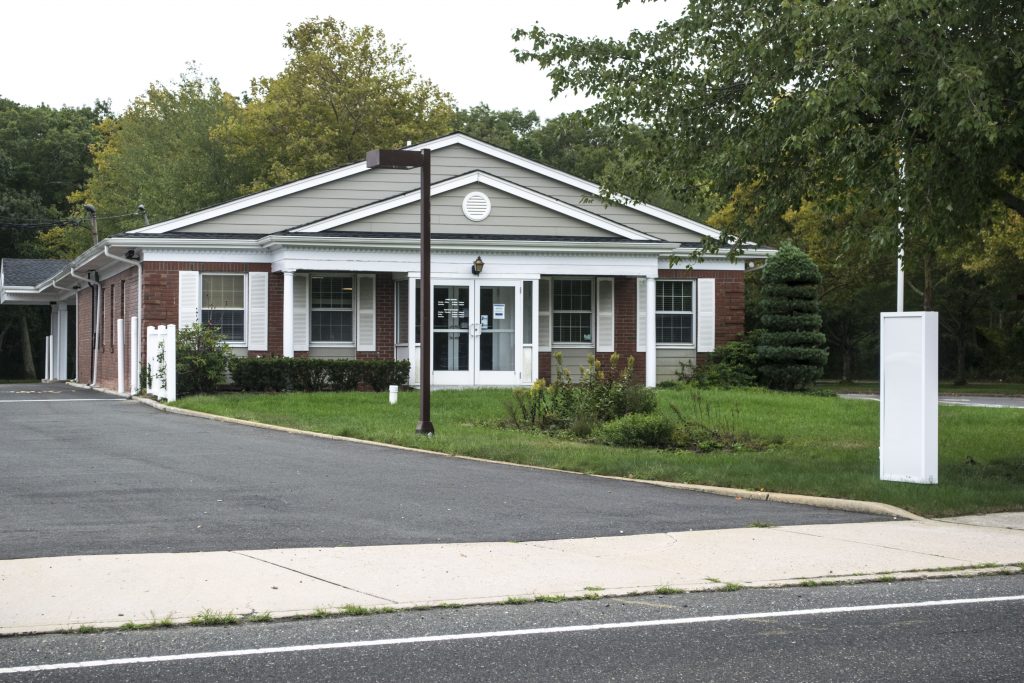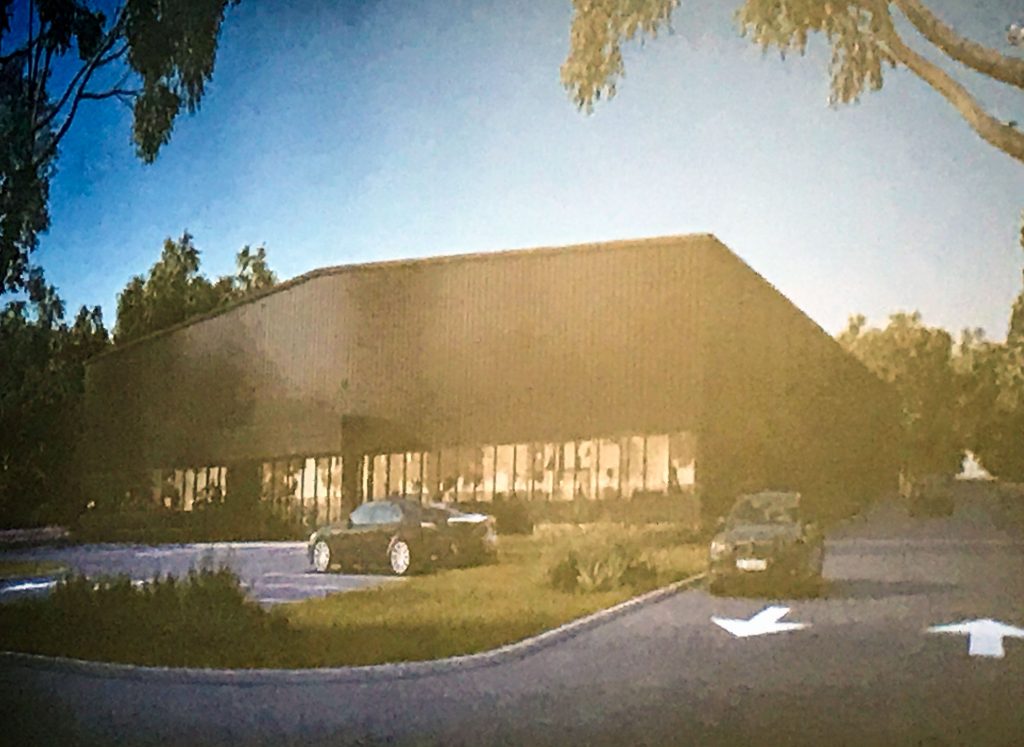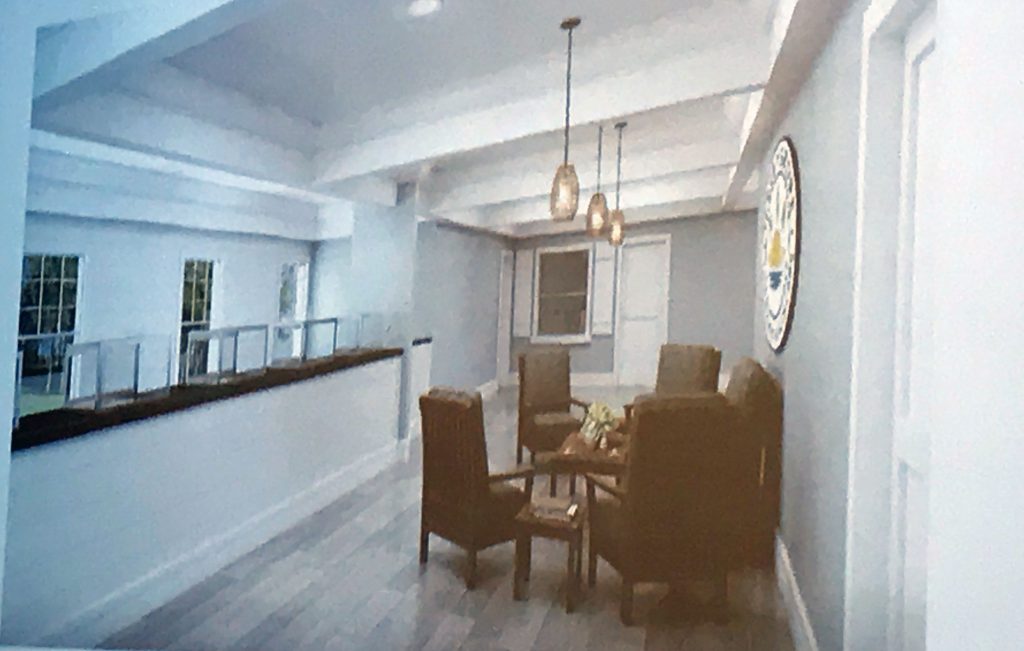A meeting led by the attorney for the Brick company hoping to gain approval to build a medical marijuana dispensary and grow house shed immense light onto the details of the proposed business’s operations, but sometimes turned tense as neighbors faced off against marijuana activists who also attended.
The two hour-long meeting introduced Anne Davis, the founder of Jersey Shore Therapeutic Health Care (JSTHC), and her staff to the community. It was led by John Paul Doyle, a local attorney who will represent the company at a zoning board hearing next week. JSTHC is seeking permission to convert an existing bank building into a dispensary for medical marijuana patients and build a 48,000 square foot grow house on the 6.7 acre plot, located at 385 Adamston Road. The project requires a use variance, the most difficult type of variance to obtain, from the township’s Board of Adjustment. It is also subject to approval from the state Department of Health, which will announce the approval of six proposed dispensaries statewide Nov. 1.

The location where a medical marijuana facility will be proposed in Brick Township. (Photo: Daniel Nee)
|
|
The meeting was packed, with a line of attendees stretching out into the main hallway of the municipal building. Most of those who spoke at the meeting were medical marijuana patients – some from Brick, and some from other Shore communities – who shared stories of how cannabis relieved pain and helped them deal with chronic illnesses. The next-largest group consisted of residents whose homes are located near the proposed site. They questioned whether a dispensary and grow house constituted a security risk, could affect their property values, or could attract transient customers to local streets. On several occasions, the residents were met with heckling by some of the activists in the room, including one who was broadcasting a live feed of the meeting on Facebook. Still, the meeting was filled with detailed information on the project, and the JSTHC staff offered to work with homeowners and promised to be a good neighbor.
The top issue was security at the site. Doyle said the company has hired Michael White, a now-retired 26-year veteran of the New Jersey State Police, to lead its security regime. White, who currently works in school security, said he has a background in homeland security assignments and assessing the security of buildings and infrastructure.
“Everything in the facility is timestamped and recorded,” said White, describing a network of 150 cameras that will be able to read license plates, identify those who come onto the property, and be available on a 24 hour live feed at the state Department of Health. “We will know the movements of everyone through that facility, 24 hours a day.”
Some neighboring residents said the very fact that so much security is required – White held up a 94-page operations manual – meant that the facility was not appropriate for an area so close to residential property. But Davis said many of the high-tech and comprehensive security measures are state requirements that were specifically put in place to assuage concerns of townspeople across the state.
Joel Allcock, who will serve as the company’s operations manager, said the dispensary will attract fewer patrons than the OceanFirst bank branch which previously occupied the site. The bank, he said, had been robbed five times over the years and the dispensary would be a much more difficult facility to rob.
White said security guards will be present at all times. They will not be armed, however, to reduce the risk of any violence during a potential robbery attempt.
A ‘Jersey Shore Feel’
Davis described the patient facility as being neatly and brightly decorated with a “Jersey Shore feel.” The site will also be discreet, she said. There will be no signage besides simple lettering on the front door, and patients will have to pre-register for a medical marijuana card, declare the Brick site as their chosen dispensary, and have both the medical card and identification confirmed before they are allowed out of the lobby and into the dispensary itself.
“We hope to keep it discreet because the only people who belong there are registered patients,” said Davis.
White said the use of marijuana is strictly prohibited on the premises and in the parking lot. Anyone who violates the rule risks being banned from the facility and anyone who drives after using the product will be reported to the police.
Davis, who runs a solo law practice in Brick and has served as the former Executive Director of NORML (
“I want this to be a good business, help our local patients, and I’m not going to allow bad things to happen,” she told neighbors who viewed the project with skepticism.
Patients will sign a “good neighbor agreement,” said Allcock.
“People think it’s an end-around so people can get high,” he said. “It’s a hell of a lot easier to get cannabis at Brick High School than it is as a patient.”
Medical Marijuana in the Community
Michael Doumas, whose home neighbors the property, said he fully supports the availability of medical marijuana, but reiterated calls to locate the facility in a more defined commercial district.
“There is a long history, from sea to shining sea, of violent robberies at these facilities,” he said. “I just can’t fathom how this is ending up in the middle of a neighborhood full of kids.”
There has been little to no data produced on the nexus between a medical marijuana dispensary to crime issues. Some residents pointed to a robbery at a dispensary in Egg Harbor Township in Dec. 2017 as an example of what they would like to avoid seeing near their homes.
Aubrey Conway, of Sayreville, attended the meeting and said better access to medical marijuana could alleviate dependence on opioid drugs in the community, which has been ravaged by heroin addiction.
“As a parent and as a patient, I can tell you that I feel safer not having opiates in my house, and I feel safer educating my children about the differences,” she said. “Nobody wants our children to be on drugs – that’s not the goal – but I hope, as a parent of football players, that if they get a concussion they will have the same medical choices that I have.”
Michael Weiss, another resident, said he was skeptical himself about trying medical marijuana to help alleviate pain from MS.
“I didn’t smoke marijuana prior to that for many, many years – since I was a kid,” he said. “I decided, when medical marijuana became available, to talk to my doctor about it. She said it would benefit me …. For the first time in many years, I was able to get a full night’s sleep. It also helps with the pressure and anxiety from dealing with a chronic condition.”
None of the residents who spoke criticized the legality of medical marijuana, but said they were uncomfortable with a facility in close proximity to residential zones.
“Once it moves out of your parking lot and people are smoking up on our street, it’s out of your hands,” one resident opined from the back of the room.
“We’ve looked outside of Brick, inside of Brick, a multitude of places – and they did not work,” explained Davis, adding that she considered the former Work Out World site on Brick Boulevard. “We did find some other properties that didn’t work. This particular location worked the best for cultivation, security – it’s discreet – all of it.”
The facility will operate as part of a “closed loop,” Allcock said, and no odor will be emitted into the outdoors. In fact, it is essential that inside and outside air do not mix, as it can affect the health of the plants.
Davis assured members of the public that the facility would never become a recreational dispensary should the state legalize a recreational market. She said she is willing to stipulate before the zoning board that she has no intention to do so and would accept a board requirement that the facility always remains for medical patients only.
“We have no intent on going recreational,” she said. “We have a medical program and we want to expand clinical research and programs that we create there. We believe, as a business model, even if it goes recreational [medical] will not pay taxes and the patients will still come to us. We’re going to be fine even if there’s a recreational market out there.”
Recreational dispensaries in other states are often larger and are affiliated with large-scale growers, research shows.
“We don’t want to be all over the state or be mega-millionaires, we just want to help people,” Davis said.
Timeline Uncertain
The dispensary’s application will be heard Wednesday, Oct. 10 by the township’s Board of Adjustment. Public comment will be accepted by the board following the testimony of witnesses and any formal objectors to the project.
Even if the board votes in favor of allowing the project to proceed, it still requires the OK of the state Department of Health. On Nov. 1, the state will announce the approval of six more dispensaries, formally known as “alternative treatment centers.” There will be two each approved for the northern, central and southern portions of the state.
“We’re very confident, but no one will know until November 1,” Davis told Shorebeat following the meeting. “There’s no indication as to what they’re doing, but we’re super confident.”
Allcock said construction would begin shortly after approvals, but a cannabis product would not be available until about this time next year.
“We have to cultivate the first harvest, build out all the rooms, and the cultivation process takes a while,” said Davis.

Advertisement

Police, Fire & Courts
Grand Jury Indicts Point Pleasant Man, Once a Fugitive, for Attempted Murder











